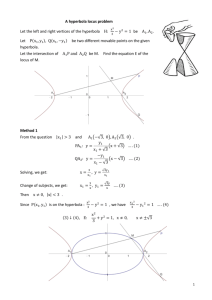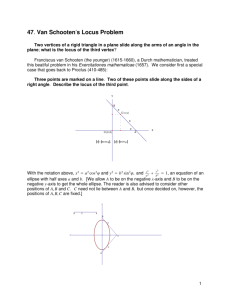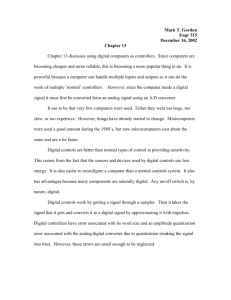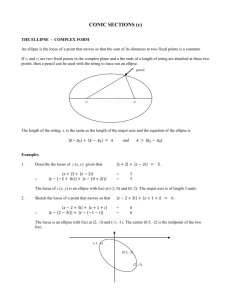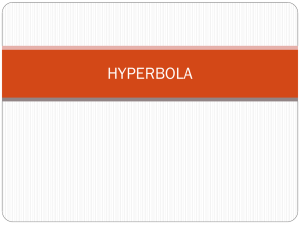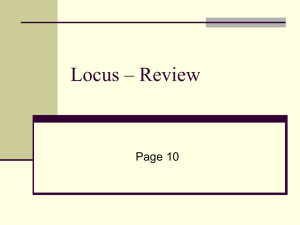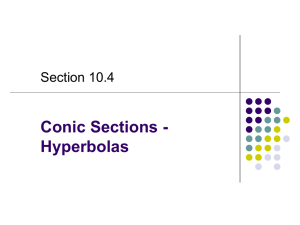A Hyperbola in complex plane
advertisement
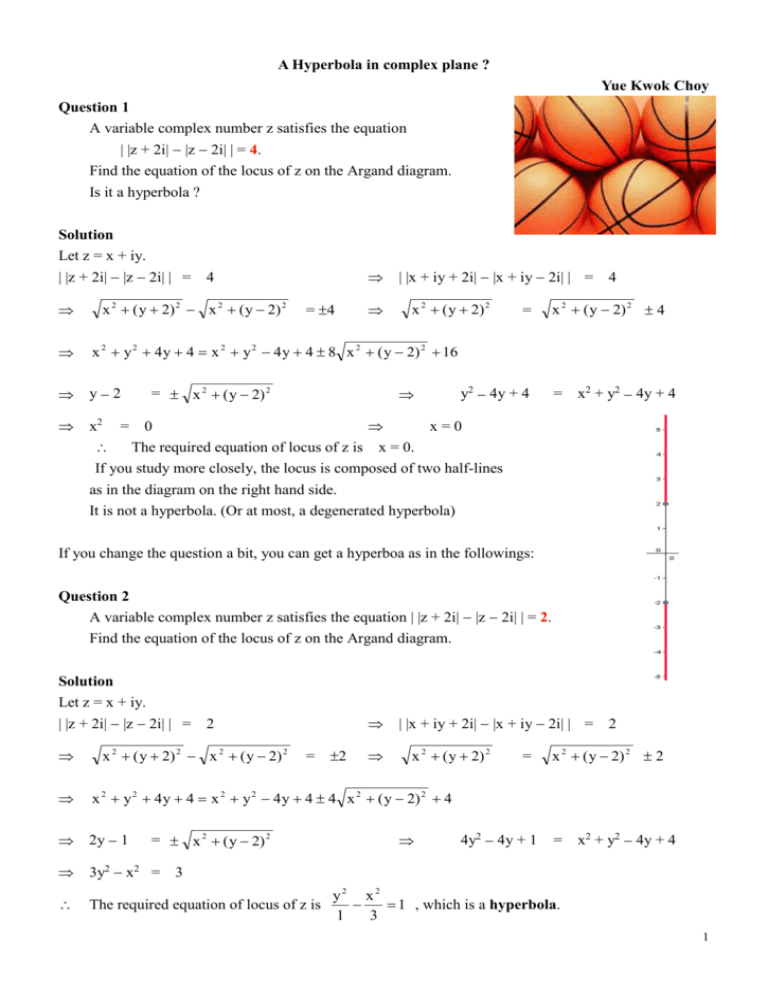
A Hyperbola in complex plane ? Yue Kwok Choy Question 1 A variable complex number z satisfies the equation | |z + 2i| |z 2i| | = 4. Find the equation of the locus of z on the Argand diagram. Is it a hyperbola ? Solution Let z = x + iy. | |z + 2i| |z 2i| | = 4 x 2 ( y 2) 2 x 2 ( y 2) 2 = 4 | |x + iy + 2i| |x + iy 2i| | = 4 x 2 ( y 2) 2 x 2 y 2 4 y 4 x 2 y 2 4 y 4 8 x 2 ( y 2) 2 16 y2 x2 = 0 x=0 The required equation of locus of z is x = 0. If you study more closely, the locus is composed of two half-lines as in the diagram on the right hand side. It is not a hyperbola. (Or at most, a degenerated hyperbola) = x 2 ( y 2) 2 = y2 4y + 4 x 2 ( y 2) 2 4 = x2 + y2 4y + 4 If you change the question a bit, you can get a hyperboa as in the followings: Question 2 A variable complex number z satisfies the equation | |z + 2i| |z 2i| | = 2. Find the equation of the locus of z on the Argand diagram. Solution Let z = x + iy. | |z + 2i| |z 2i| | = 2 x 2 ( y 2) 2 x 2 ( y 2) 2 = 2 | |x + iy + 2i| |x + iy 2i| | = 2 x 2 ( y 2) 2 = x 2 ( y 2) 2 2 x 2 y 2 4 y 4 x 2 y 2 4 y 4 4 x 2 ( y 2) 2 4 2y 1 = x 2 ( y 2) 2 3y2 x2 = 3 The required equation of locus of z is 4y2 4y + 1 = x2 + y2 4y + 4 y2 x 2 1 , which is a hyperbola. 1 3 1 The Argand diagram is as follows: y 3 The foci of the hyperbola are: 2i . 2 1 -3 -2 O -1 Challenge 1 2 3 x -1 A variable complex number z satisfies the equation -2 | |z + 2i| |z 2i| | = 8. Find the equation of the locus of z on the Argand diagram. -3 Is it a hyperbola ? What is wrong with the following "Solution" ? Let z = x + iy. | |z + 2i| |z 2i| | = 8 x 2 ( y 2) 2 x 2 ( y 2) 2 = 8 | |x + iy + 2i| |x + iy 2i| | = 8 x 2 ( y 2) 2 x 2 ( y 2) 2 8 = x 2 y 2 4 y 4 x 2 y 2 4 y 4 16 x 2 ( y 2) 2 64 8y 64 16 x 2 ( y 2) 2 y 8 2 x 2 ( y 2) 2 y 2 16 y 64 4x 2 y 2 4y 4 4x 2 3y 2 48 x 2 y2 1 12 16 y 4 Is the locus an ellipse with foci: 2i ? 3 2 But obviously, the point 4i, which is on the locus, does not satisfy the equation: | |z + 2i| |z 2i| | = 8 1 -5 -4 -3 -2 -1 O 1 2 3 4 x -1 -2 2 2 x y 1 , what is it? 12 16 Where is the wrong step in the above calculations? If the locus is not -3 -4 Solution of Challenge 2 The equation : Let Let | |z + 2i| |z 2i| | = 8 has no locus in the complex plane . zA = 2i , zB = 2i and A, B be their corresponding point in Argand diagram. P be any point in the complex plane . The distance AB = | zA zB | = |2i – (– 2i)| = 4 …. (1) By the Triangular inequality, (a) If PA > PB, then AB + PB > PA. AB > PA – PB (b) If PB > PA, then AB + PA > PB. AB > PB – PA In any of the above case, we have AB > |PB – PA| | |z + 2i| |z 2i| | 4 > |PB – PA| = By (1) and (2), we get …. (2) | |z + 2i| |z 2i| | = 8 has no locus in the complex plane , since the L.H.S. of the equation < 4 z . The mistake of the calculations to get an ellipse comes from squaring. You can see that the point x 2 ( y 2) 2 (0, 4) which is on the ellipse = x 2 ( y 2) 2 8 x 2 y2 1 does not satisfy : 12 16 (L.H.S. = 6, R.H.S. = 10 or 6) However, (0, 4) satisfies the steps that follow in the above calculations after squaring. If we begin with |z + 2i| + |z 2i| = 8, | |x + iy + 2i| + |x + iy 2i| | = 8 x 2 ( y 2) 2 x 2 ( y 2) 2 the calculations are as follows: =8 x 2 ( y 2) 2 = 8 – x 2 ( y 2) 2 x 2 y 2 4 y 4 64 16 x 2 ( y 2) 2 x 2 y 2 4 y 4 8y 64 16 x 2 ( y 2) 2 y 8 2 x 2 ( y 2) 2 y 2 16 y 64 4x 2 y 2 4y 4 4x 2 3y 2 48 x 2 y2 1 12 16 Further investigation Do you think that |z + 2i| + |z 2i| = 2 can give a hyperbola : y2 x2 1 ? 3 3
